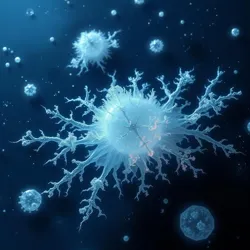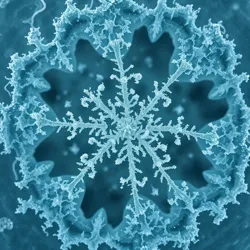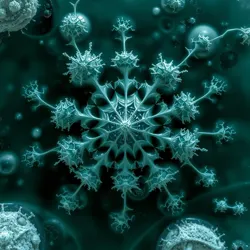Titanean Frost Organisms
Titanean Frost Organisms (TFOs) are a unique class of methane-based lifeforms discovered in 2149 within the frozen methane lakes of Saturn's moon Titan. These remarkable entities represent the first confirmed instance of life utilizing liquid methane as a solvent instead of water, revolutionizing our understanding of possible biochemistries.
 A colony of Titanean Frost Organisms displaying characteristic crystalline patterns in liquid methane
A colony of Titanean Frost Organisms displaying characteristic crystalline patterns in liquid methaneBiology
TFOs possess a distinctive triple-helix molecular structure that allows them to maintain biological processes at temperatures as low as -179°C. Their cellular membranes are composed of unique azotosome compounds that remain stable in liquid methane and ethane.
Metabolic Processes
These organisms derive energy through a process termed cryogenic photosynthesis, converting acetylene and ethane into more complex hydrocarbons. This metabolism produces characteristic crystalline structures that grow in fractal patterns across Titan's hydrocarbon seas.
 Metabolic crystal formations created by TFO colonies in laboratory conditions
Metabolic crystal formations created by TFO colonies in laboratory conditionsDistribution
TFOs have been found primarily in Titan's polar regions, particularly in:
- The methane lakes of Kraken Mare
- Subsurface hydrocarbon deposits
- Atmospheric methane droplets
- Cryovolcanic vents
Scientific Significance
The discovery of TFOs has fundamentally altered astrobiology's search parameters for extraterrestrial life. Their unique biochemistry suggests the possibility of similar organisms existing on other methane-rich worlds throughout the galaxy.
 Time-lapse imaging showing TFO growth patterns over a 72-hour period
Time-lapse imaging showing TFO growth patterns over a 72-hour periodResearch Applications
Current studies focus on:
- Adaptation of TFO membrane technology for extreme cold environments
- Development of methane-based computing systems
- Applications in cryogenic storage technology
- Understanding alternative biochemistries
See Also
- Methane-Based Biology
- Cryogenic Evolution
- Alternative Biochemistry
References
- Journal of Xenobiochemistry
- Titan Biological Survey
- Proceedings of the Cryogenic Life Conference